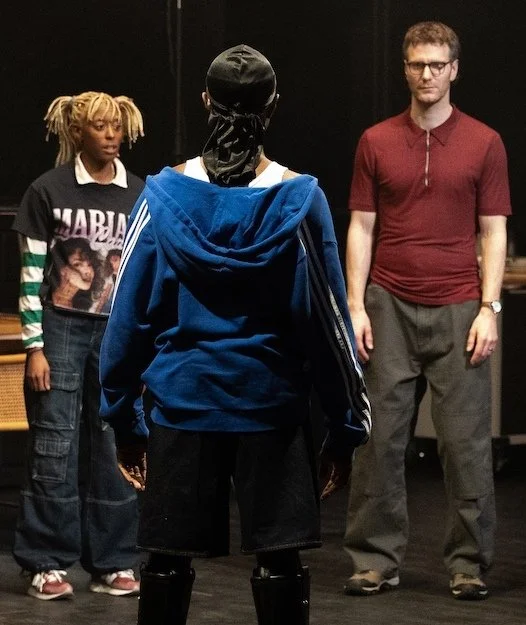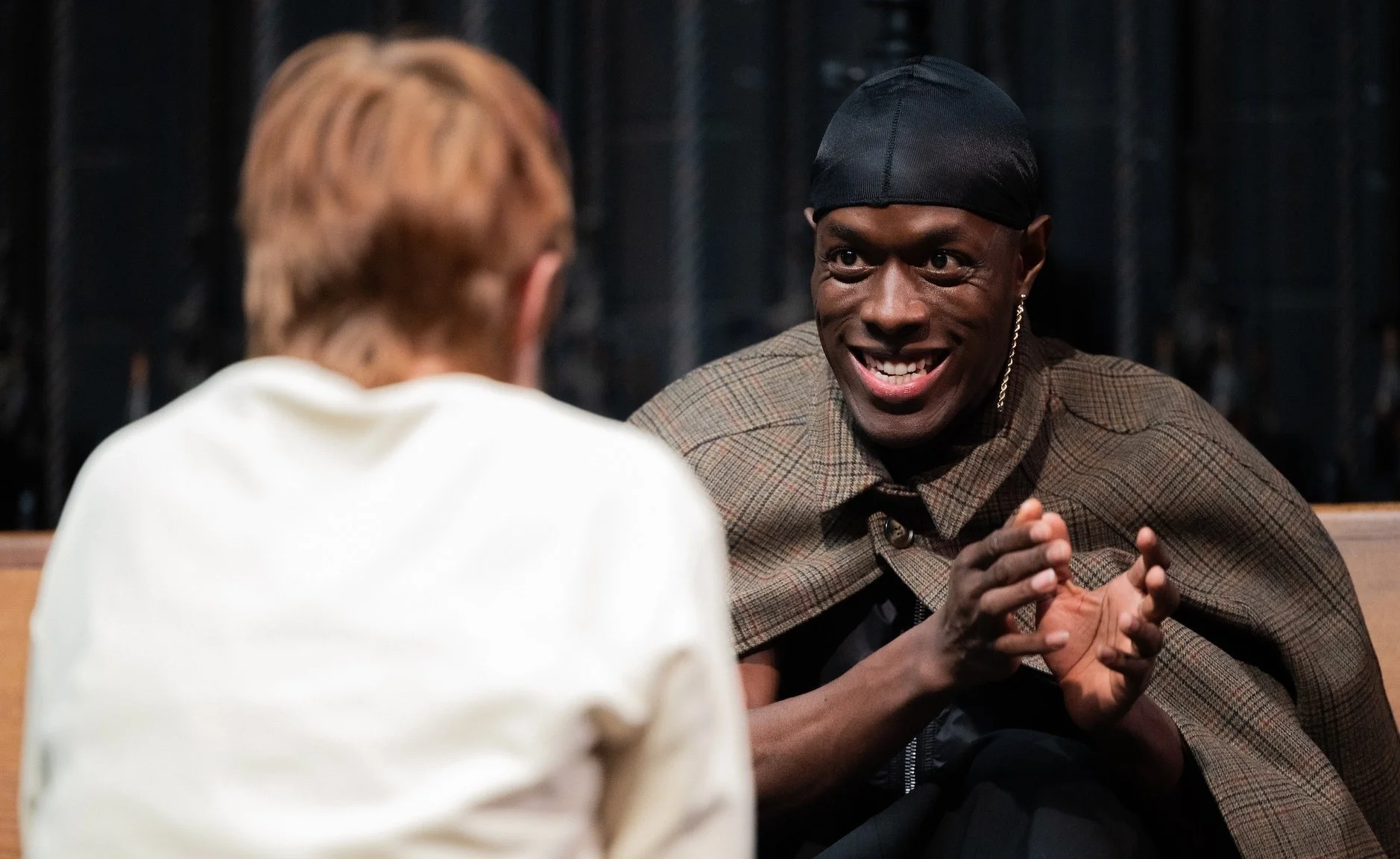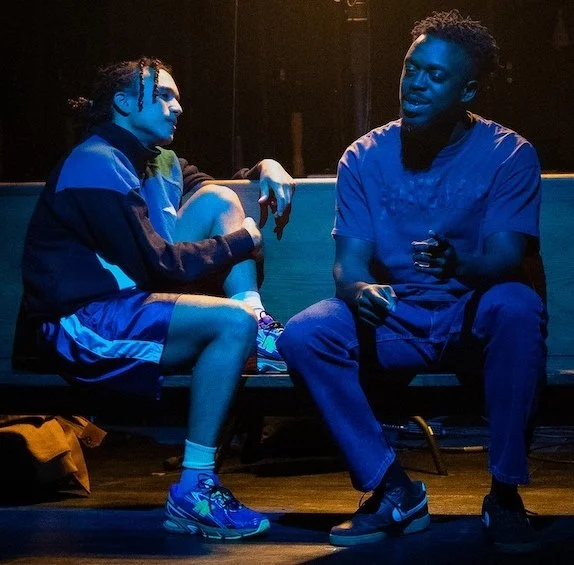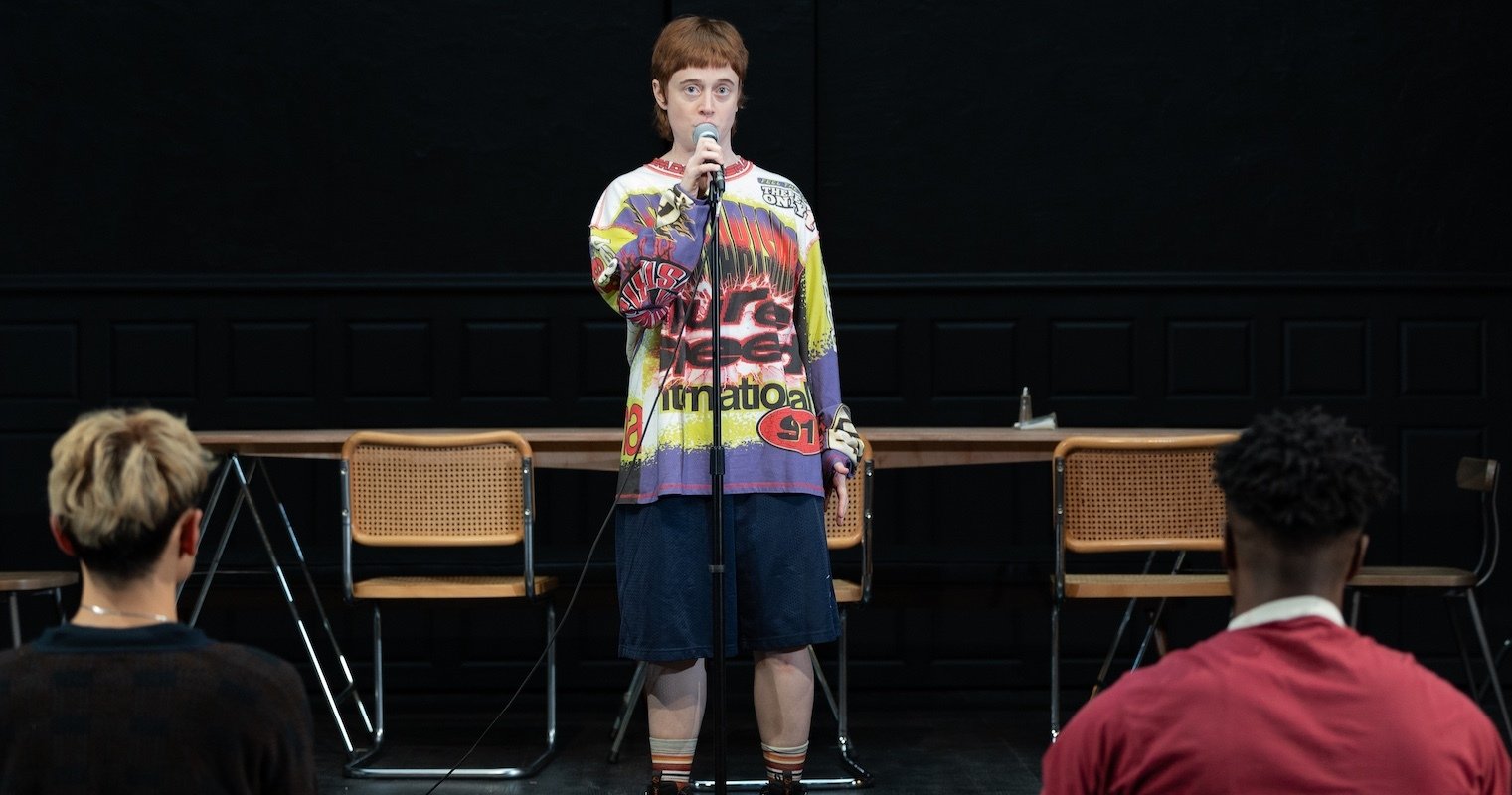Savannah (Amandla Jahava) and Walton (Mark Junek) receive instruction from their director, Asa Leon (Ronald Peet, facing away).
In his play Practice, Nazareth Hassan delivers an uncomfortable yet unflinching depiction of what it takes for an artist to achieve his vision, allowing director Keenan Tyler Oliphant to stage a powerful production that the script fully earns. The story follows a group of actors and an ascendant theater star, Asa Leon, who subjects them to a rigorous development process for his next project. Asa pursues his vision with messianic dedication, drawing his actors into that vision without regret or apology. The result is distressing, at times brutal, and ultimately thrilling.
Hassan has designed a metaplay that exposes the depth to which actors must excavate their own experiences in order to create. They are guided—sometimes confronted—by their director, Asa, played with extraordinary focus by Ronald Peet. Asa sees himself as a cultlike leader, and theater as a cult:
You build a community towards a common belief or goal, and you dedicate all of your time and energy to realizing that. This, coupled with the fact that theater makes emotionality, psychology, and spirituality into a material to be manipulated.
Asa explains exactly what he wants from one of his actors: commitment and trust.
Asa is preparing his next avant-garde performance scheduled for Berlin and London runs. He has selected seven young actors to begin rehearsals. All are excellent, each projecting a willingness to trust their director’s process enthusiastically. As part of that process, Asa requires each actor to reveal one secret to the ensemble to “build trust.”
This exercise exposes the actors’ vulnerability as they confess shame, guilt, sexual abuse, worthlessness, confusion. Of note, German performance artist Rinni (Susannah Perkins) provides welcome humor, while Chilean actress Mel (Karina Curet) makes an agonizing admission for the benefit of the troupe. After weeks of this work, the group adopts the mantra: “I’m useless and that’s OK.”
Keeyon (Hayward Leach) and Ro (Opa Adeyemo) talk about their lives and thoughts of their director’s process.
Other bonding exercises include physical training: daily running in place, synchronized breathing and jumping, and continued confession of personal inadequacies. Gradually, a powerful group identity forms—essentially, a cult. Asa boasts, “I’ve taken up residence in the bodies and minds of my company. They would do anything for me.”
Over the course of eight weeks—staged inside a former church—Asa exerts increasing control over the performers’ lives. He never apologizes for his overbearing behavior and instructs them never to say “sorry,” but instead to “examine and respond.”
During the rehearsal period, Asa grows more despotic, breaking down his troupe’s defenses and sense of worth. Under his thrall, they trust him implicitly, effusively expressing gratitude for the opportunity to work with a director who casually mentions he is a MacArthur “genius.” Only one actor expresses doubt, and she leaves the show after being humiliated by Asa. Act I concludes as the troupe prepares to perform.
Act II features the performance itself: Self Awareness Exercise 001, subtitled How to Start a Cult—the culmination of the troupe’s eight weeks of work. An enclosed, mirrored box contains the actors. All the actors assume the personality and characteristics of their assigned partners. Asa deliberately pairs actors who are the least compatible, forcing them outside their lived experience. When questioned by a cast member about her assignment, he explains: “I cast you this way because your play partner … is diametrically opposed to you in the external projection of emotionality and personality.”
Rinni (Susannah Perkins) shares her life secrets to other members of the cast. Photographs by Alexander Mejía, Bergamot.
The performance is organized into the series of steps that Asa followed to create the cult that was his vision, for example: i. A Charismatic Entrance; ii. Bonding; iii. Syncing Up, etc. The result is an explanation of what happened in Act I and Asa’s rationale of why he chose that approach and of what he had to do to become an artist.
Befitting the play-within-a-play structure, the Act I set (by Afsoon Pajoufar) resembles a black-box theater outfitted with recording equipment. Pajoufar reinforces the sense of surveillance with microphones installed throughout the space. Asa can replay private conversations, and he has his assistant read transcripts aloud to reassert control. Asa’s husband, Walton (Mark Junek), the faux production’s set designer, and Asa’s assistant, Danny (Alex Wyse), remain ever-watchful.
A striking feature of the staging occurs during intermission, when the performance cube is constructed. True to his need for control, Asa remains on stage during intermission to oversee the project. It is a light moment when Asa signals his appreciation of the finished set—one of many light moments Asa uses to lessen the heaviness of the Practice’s topic.
Practice is three hours of intelligent, focused theater filled with remarkable performances. No apologies needed for its length.
Nazareth Hassan’s Practice runs through Dec. 7 at Playwrights Horizons (416 West 42 St.). Evening performances are at 7 p.m. Tuesday through Sunday; matinees are at 2 p.m. Saturday and Sunday. For tickets and more information, visit playwrightshorizons.org.
Playwright: Nazareth Hassan
Director: Keenan Tyler Oliphant
Scenic Design: Afsoon Pajoufar
Lighting Design: Masha Tsimring
Costume Design: Brenda Abbabdandoto & Karen Boyer
Sound Design: Tei Blow






